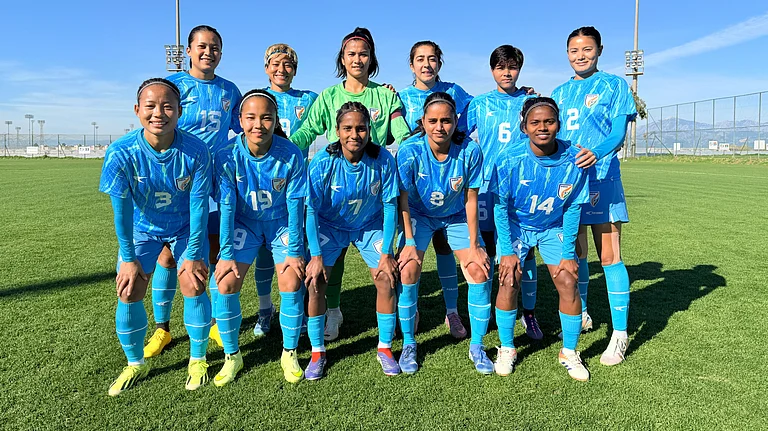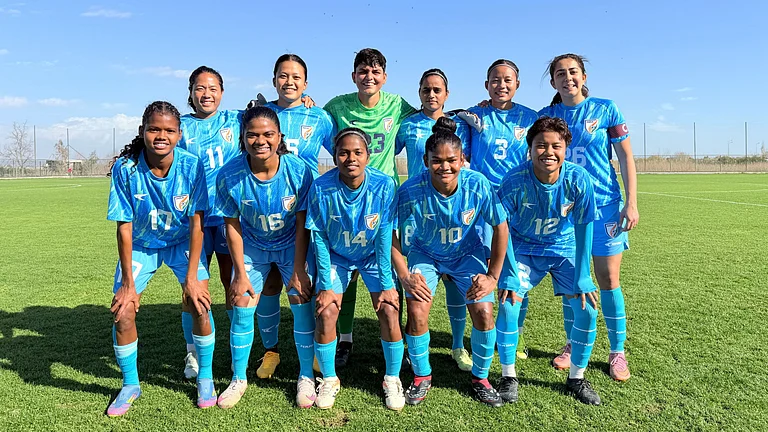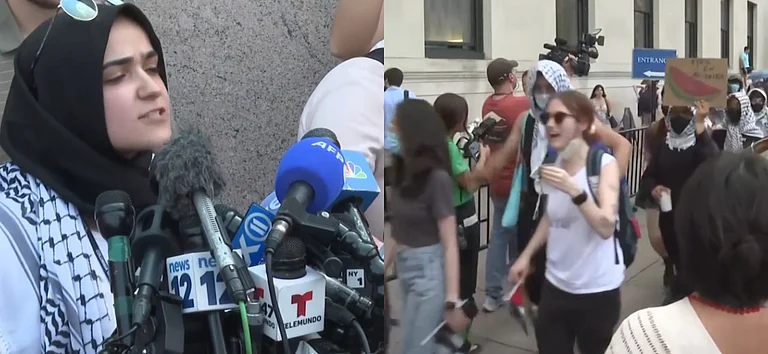
Summary of this article
Police removed approximately 30 to 40 people from inside Columbia University's Hamilton Hall late Tuesday after pro-Palestinian protesters occupied the administration building earlier in the day.
After the school's president declared that safety and order on campus could only be assured with police assistance, NYPD officers intervened. The occupied building extended the protesters' presence beyond an encampment elsewhere on the Ivy League school's grounds.
Police presence will be maintained until May 17, till the end of the university's commencement events. With commencement ceremonies approaching, administrators are under increased pressure to disperse protesters as demonstrations sparked by Columbia's protests earlier this month have spread across the country from California to Massachusetts.
This police action coincided with the 56th anniversary of a similar intervention to disband a student occupation of Hamilton Hall, which was then a protest against racism and the Vietnam War in 1968.
On Tuesday night, a large contingent of police officers entered Columbia University to end the occupation of an administration building by pro-Palestinian protesters and dismantle a protest encampment. This action followed the school president's assertion that ensuring safety and restoring order on campus required police intervention. The scene unfolded around 9 p.m. as officers, clad in helmets and equipped with zip ties and riot shields, gathered at the university's entrance. Many officers entered the occupied building through a window, using a ramp raised from the top of a police vehicle. Several protesters were apprehended and removed from campus via buses.
This confrontation occurred over 12 hours after demonstrators seized control of Hamilton Hall shortly after midnight on Tuesday, expanding their presence from a nearby encampment that had been established for nearly two weeks to protest against Israel's war on Gaza.
Remarkably, this police action coincided with the 56th anniversary of a similar intervention to disband a student occupation of Hamilton Hall, which was then a protest against racism and the Vietnam War.
In a statement released after the police intervention, the university described its decision to request assistance from the NYPD as a measure of last resort. Prior to this, the police department had maintained that officers would only enter the campus at the college administration's request or in the event of an imminent emergency.

The university's statement stated, “After the University learned overnight that Hamilton Hall had been occupied, vandalised, and blockaded, we were left with no choice." They emphasized that their public safety personnel were forced out of the building and one facilities worker was threatened. “The decision to reach out to the NYPD was in response to the actions of the protesters, not the cause they are championing," the statement said.
"We have made it clear that the life of campus cannot be endlessly interrupted by protesters who violate the rules and the law.”
With protests spanning from California to Massachusetts and commencement ceremonies approaching, administrators are under heightened pressure to address the situation.
Echoes of History: Police Arrests at Columbia University Align with 1968 Vietnam War Protests

Over the past fortnight, more than 1,000 demonstrators have been apprehended on various campuses across states like Texas, Utah, Virginia, North Carolina, New Mexico, Connecticut, Louisiana, California, and New Jersey, with some arrests occurring after clashes with police in riot gear.
The police action at Columbia on Tuesday coincided precisely with the 56th anniversary of a similar incident in 1968 when officers entered Hamilton Hall to arrest protesters who had occupied the building. These students, arrested on April 30, had seized control of the hall and other campus structures for a week to protest against racism and the Vietnam War.
Reactions of Political Leaders
Former President Donald Trump shared his views on Columbia's unrest during a call to Sean Hannity's show on Fox News Channel while live footage of police clearing Hamilton Hall aired. Trump commended the officers but expressed regret that the situation had escalated to this point He stated, "They should have done it a lot sooner than before they took over the building because it would have been a lot easier if they were in tents rather than a building. And tremendous damage done, too.”
Columbia President Minouche Shafik conveyed the administration's request for police action in a letter to senior NYPD officials, expressing regret for the necessity of such measures. Earlier in the day, New York City Mayor Eric Adams urged protesters to depart before the arrival of law enforcement, advising them to continue their advocacy through alternative channels.
“Walk away from this situation now and continue your advocacy through other means,” he said. “This must end now.”

Before police intervention, the White House condemned the standoffs at Columbia and California State Polytechnic University, Humboldt, where protesters had occupied two buildings until officers intervened with batons overnight, resulting in the arrest of 25 individuals. Officials estimated damages at the northern California campus to exceed USD 1 million.
President Joe Biden disapproved of the students' tactics, stating that occupying academic buildings is not a form of peaceful protest. Other universities, such as Northwestern, have negotiated compromises with protesters to ensure peaceful demonstrations leading up to the end of the academic term. As discussions for a cease-fire gained momentum, it remained uncertain whether these negotiations would lead to a reduction in protests.
Everything about the Students Protesting at Columbia University (Till Now)
The nationwide campus protests originated at Columbia University in response to Israel's war on Gaza following an attack by Hamas on southern Israel on October 7. The conflict resulted in the deaths of approximately 1,200 people, mostly civilians, and the taking of around 250 hostages. Israel's response has led to the deaths of more than 34,000 Palestinians in the Gaza Strip, according to the local health ministry.

The protests at universities have been labeled as antisemitic by Israel and its supporters, while critics argue that these accusations are used to suppress dissent. Although some protesters have been filmed making antisemitic remarks or threats of violence, organizers, including some who are Jewish, assert that the movement is peaceful and aimed at advocating for Palestinian rights and opposing the war.
On Columbia's campus, protesters united by linking arms and transporting furniture and metal barricades to Hamilton Hall, one of several buildings occupied during a civil rights and anti-Vietnam War protest in 1968. The building was renamed Hind's Hall in honor of a young girl killed in Gaza by Israeli fire.
The occupation occurred after protesters disregarded an earlier ultimatum to vacate a tent encampment on Monday, facing suspension if they failed to comply. The occupiers vowed to remain in Hamilton Hall until the university meets their demands for divestment, financial transparency, and amnesty.

After police cleared an encampment at the university on April 18 and arrested over 100 people, students defiantly set up tents again. They had been protesting on the Manhattan campus since the previous day, expressing opposition to Israeli military actions in Gaza and calling for the school to divest from companies they allege are profiting from the conflict.
Despite faculty efforts to mediate, the Columbia University Chapter of the American Association of University Professors lamented that the administration repeatedly ignored their consultations, in violation of school statutes. The group warned of potential clashes between nearby police officers and campus protesters, holding university leadership responsible for any resulting injuries.
Mayor Adams asserted on Tuesday that the Columbia protests have been infiltrated by outside instigators. However, he did not offer specific evidence to support this claim, which was refuted by protest organizers and participants. Similar assertions were made by NYPD officials during the widespread demonstrations against racial injustice following George Floyd's death in 2020. In some cases, peaceful marches organized by well-known local activists were erroneously labeled as the work of violent extremists.





























